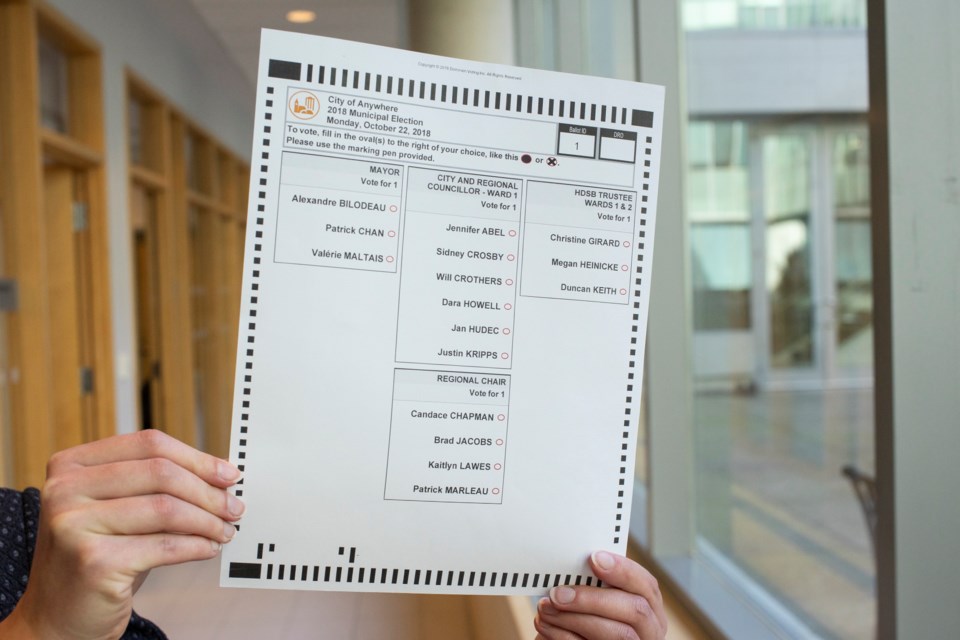Sault Ste. Marie will investigate using advanced voting technology in the next municipal election, scheduled for Monday, Oct. 24, 2022.
Madison Zuppa, deputy city clerk, is planning a community engagement initiative to gather public sentiment about vote-counting technology as well as alternative voting methods and locations.
Zuppa wants to consider election options including:
- In-person manual count – eligible voters physically attend a specified voting location to cast their ballot. Once the ballot is given to the voter, their name is struck off the voters' list. Once the ballot is cast, it's placed into a secure box for manual counting once voting is closed
- In-person tabulator count – eligible voters physically attend a specified voting location to cast their ballot. Once the ballot is given to the voter, their name is struck off the voters' list. Once the ballot is marked, the voter feeds the ballot into a tabulator. The tabulator scans and interprets the ballot, and the vote is cast. The ballot is deposited into a secure ballot box. The tabulator provides a cumulative total of all votes cast once voting is closed
- Vote by mail – eligible voters receive a ballot package in the mail that includes instructions, voter declaration card, a ballot, secrecy folder, and a postage pre-paid return envelope. Once returned, the voter’s name is struck off the voters' list, and the secrecy envelope containing the ballot is placed in a secure ballot box until voting day. Votes may be counted manually or by use of tabulators once voting is closed
- Vote online – eligible voters cast their vote on a specified website. Voters receive voting credentials (e.g. identification number and PIN) and use them to receive an electronic ballot. The voter makes their selection(s) and casts their ballot over the Internet. Once the ballot is cast, the voter’s name is struck off the voters' list. Once voting is closed the results are generated and provided to the clerk
- Vote by phone – eligible voters cast their vote by calling a designated telephone number. Voters receive a PIN and may be required to answer a security question. Once validated, an audio version of the ballot is presented to the voter. Once the selection(s) is made and confirmed the vote is cast and the voter’s name is struck off the list. Once voting is closed the results are generated and provided to the clerk
"The City of Sault Ste. Marie has historically used paper ballot/manual count," Zuppa says.
"In the 2018 election the city also provided a home-visit program, where eligible voters could register to have a ballot box brought to their home. It was a very successful program that provided greater accessibility for voters. In 2018, 66 voters participated in the Vote from Home program."
Just over 40 per cent of Sault Ste. Marie's eligible voters cast ballots in the 2018 municipal election.
From 1988 and 2014, the average province turnout has been between 40 and 45 per cent.
"Voting has historically been done by congregating in enclosed spaces locations, which is known to present a significant risk of spreading COVID-19," said Ward 3 Couns. Matthew Shoemaker and Donna Hilsinger in a resolution accepted last night.
"Elections that have taken place during the pandemic have seen a high percentage of voter turnout, including in the British Columbia provincial election in 2020, in the United States presidential election in 2020."
"Other elections held during the pandemic have been fraught by delays due to rising COVID case numbers, such as the 2021 Newfoundland and Labrador provincial election."
"Though vaccines are set to be administered to all Canadians who want them in 2020, it is unknown if the coronavirus will re-occur seasonally or if it will be eradicated by vaccines."
Shoemaker and Hilsinger called on the city to plan for foreseeable challenges to our electoral process, looking specifically at options to mail ballots to all registered voters and finding the safest way to have those ballots returned to city officials.
However, use of mail-in ballots and vote-tabulation technology has been deeply divisive south of the border.
Late last week, Dominion Voting Systems filed a $1.6-billion defamation lawsuit against Fox News, accusing the cable news outlet of falsely claiming it had used algorithms in its voting machines to rig the 2020 U.S. election.
Dominion's technology is widely used in Ontario.
Technical glitches during the 2018 municipal elections slowed results in more than 50 municipalities serviced by Dominion.
Some, including Greater Sudbury, were forced to extend voting by a full day.
"I would be hesitant to be at the front of the line on that one," Shoemaker said last night. "But it does seem that from other elections happening in British Columbia and the U.S. that mail-in ballots have increased turnout from past elections."
Ward 4 Coun. Marchy Bruni expressed concern that the preliminary list of electors is always out of date.
"I found 17 names in the pages in my preliminary list of electors, that no longer live in the Sault," Bruni said.
"Some of the children don't live with the parents any more. They live elsewhere. They're still on the electoral list to the ward."
That are perennial problems with the MPAC [Municipal Property Assessment Corp.] data that we have," said City Clerk Rachel Tyczinski.
"Certainly, the city clerk's office is as frustrated or more so than anyone else with the quality of that data."
Tyczinski said that in 2022, data sharing with Elections Ontario may start to result in a more accurate voters' list.
"However, for the 2022 election, we're still using the MPAC data and I can only indicate that we're as frustrated as anybody else with it." she said.
Ward 1 Coun. Sandra Hollingsworth asked that local elections officials keep in mind seniors with disabilities who may not be able to use computers.
